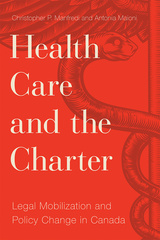
Delivering Policy
The Contested Politics of Assisted Reproductive Technologies in Canada
Are assisted reproductive technologies (ARTs) such as in vitro fertilization a medical issue or a matter of public policy, subject to restrictions? In Delivering Policy, Francesca Scala employs the concept of boundary work to explain the prolonged debates that ensued when the Canadian government appointed a royal commission in 1989 to draw up a blueprint for legislative action.
From the birth of the first “test tube baby” in 1978 to the passage of the Assisted Human Reproduction Act in 2004, Scala reveals how policy makers, civil society actors, and members of the medical-scientific community attempted to define assisted reproductive technologies from within the realms of science or politics. They challenged, defended, or blurred the divisions between the two fields of knowledge to secure their position as the authoritative voice not only on the issue of ARTs but also on the governance of science more broadly.
Delivering Policy delineates in vivid detail the people, institutions, and processes – from royal commissions and public consultations to parliamentary politics – that influenced ARTs policy in Canada. This compelling account contributes to our understanding of the interaction between science and politics, the exercise of social control over science and technology, and the politics of expertise in policy making.
This book will appeal to anyone interested in the role of science in politics and policy making, including students and scholars in the fields of policy studies, Canadian politics, science and technology studies, sociology, and policy analysis.
Awards
- 2020, Shortlisted - Donald Smiley Prize, Canadian Political Science Association
In Delivering Policy, Francesca Scala provides a comprehensive, fascinating and well-written study of the evolution of assisted reproductive technology policies in Canada. Through the concept of boundary work, Scala demonstrates how different actors – scientists, policy-makers, activists - have attempted to challenge, blur or reinforce the boundary between science and politics since the appointment of the Royal Commission on New Reproductive Technologies in 1989. Weaving a detailed analysis of policy documents with engaging testimonies from participants in those debates, the book ultimately presents a nuanced and persuasive account of the impact of discursive strategies and the broader political and institutional contexts.
Francesca Scala engages with one of the thorniest issues in contemporary policy making, the regulation of human biotechnology. Delivering Policy provides a fascinating exploration of policy contention at its sharpest: the (re)negotiation of the boundaries between politics, policy, and science. This book is a must-read for anyone interested in contentious policy process and in the interaction between norms, science, and policy making in Canada and around the world.
Delivering Policy is a thorough and fascinating account of the evolution of assisted reproductive technologies in Canada. Francesca Scala provides a carefully considered genealogy of the boundary between science and politics, and the ways in which that boundary determines the limits and potential for biotechnology and human reproduction.
In Francesca Scala’s capable hands, the incredible evolution of assisted reproductive technology–related policy in Canada becomes a fascinating story. This is an entertaining and informative read.
Delivering Policy provides a fascinating account of the history, influence, and legacy of the Royal Commission on New Reproductive Technologies. It will be an invaluable resource for those interested in the intersection of politics, medicine, and science in Canada.
Francesca Scala is an associate professor of public policy in the Department of Political Science at Concordia University. She is the co-editor of Fertile Ground: Exploring Reproduction in Canada.
1 Politics, Science, and ARTs Policy in Canada
2 Normalizing and Resisting Assisted Reproductive Technologies: Canadian and Comparative Perspectives
3 Claiming and Contesting Epistemic Authority: The Royal Commission on New Reproductive Technologies
4 Science and the Public Weigh In: The Discursive Terrain of ARTs Policy Making
5 “Proceed with Care”: (Re)negotiating the Science/Politics Divide
6 Setting Boundaries and Crafting ARTs Legislation
7 Science, Boundary Work, and Parliamentary Politics: The Passing of Bill C-6
8 Understanding Boundary Work and ARTs Policy in Canada
Notes; References; Index









